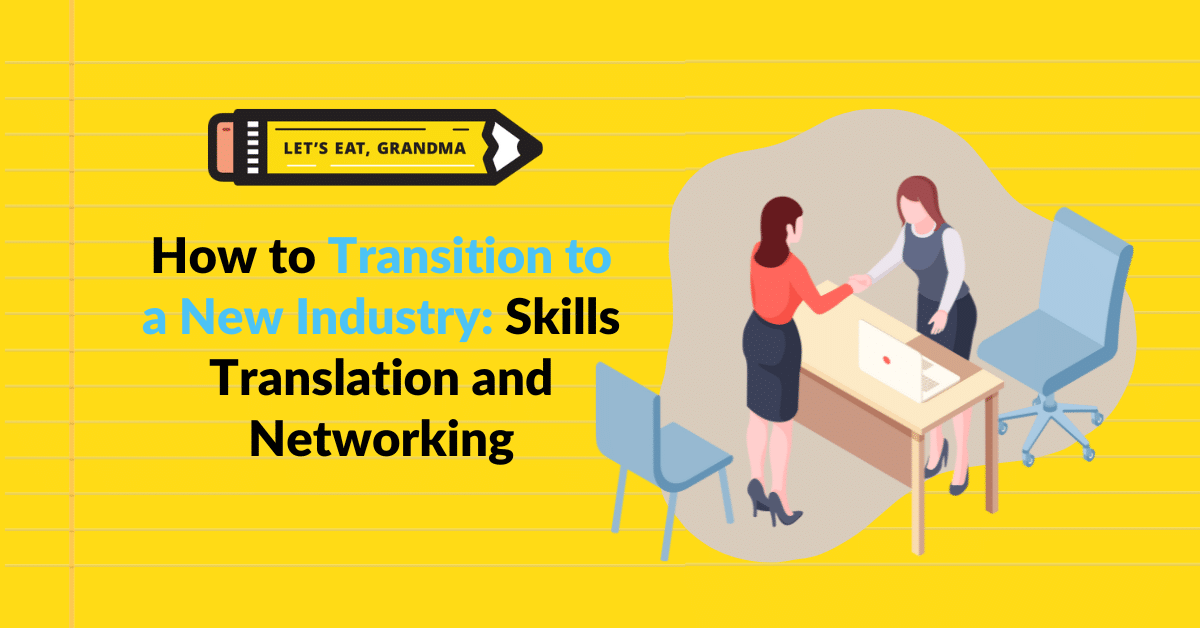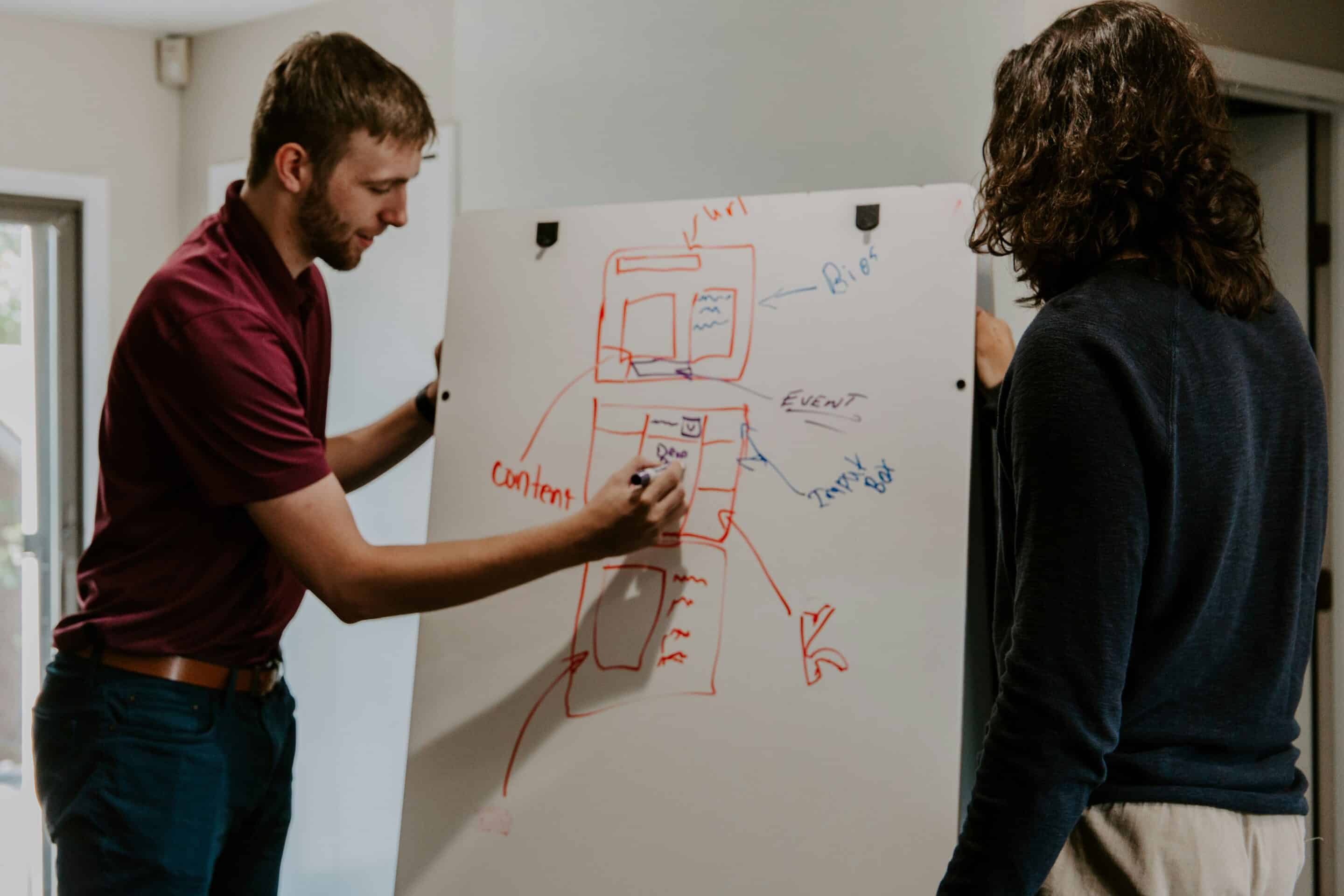If you’re planning on a career change, you shouldn’t be feeling that you’re doing it alone. Did you know that 60% of adults have changed careers at least once?
That continues to be the norm in our fast-paced, ever-changing job market (and we’re not using these words as a cliche – there are now jobs that didn’t exist a decade ago and positions that are becoming obsolete).
The reasons behind career changes vary from person to person. It could be for the sake of personal growth, a result of an industry decline, a need for a new challenge, or simply a desire for a better work-life balance. However, the one thing that’s consistent across everyone during this phase is the need for a smooth and successful transition.
This is precisely why it’s essential to learn how to effectively translate your skills from your current industry to a new one. It’s not about starting from scratch; it’s about building on what you already have. On top of that, you have to accompany that with networking – forming relationships and connections in your desired industry that will help you in your transition.
In this guide, we’ll talk about the steps to make that happen.

Photo by Caleb Jones on Unsplash
Understanding your transferable skills
Transferable skills are qualities and experiences that you’ve gained in one job or industry that are valuable and relevant to another. In other words, they’re abilities that you can use in different settings and jobs.
The first step in successfully translating your skills is to identify them. To do so, you can start by making a list of your previous job responsibilities and achievements. Then, think about what skills you used to get the job done rather than focusing on the specific tasks.
For instance, if you’re transitioning from a marketing role in the beauty industry to a sales position in the tech industry, you’ll sit down and think about the skills you used in your marketing job. These could be skills like communication, customer service, creativity, project management, and data analysis.
If you think about it, these skills can be applied in the new industry as well, even though the job responsibilities and tasks may differ.
So after pinning down the skills you used in your previous job, analyze job descriptions in your desired industry to see which skills are required. That way, you’ll be able to identify ways in which your existing skills match those needed in the new industry.
Pro Tip: Transferable skills don’t even have to be work-related. They can also include skills that you’ve gained during school or university (such as teamwork, time management, and problem-solving) or even hobbies (like writing, photography, or social media management). Brainstorm all your different skills and see how they can be relevant in different industries and roles.

Photo by Daniel Thomas on Unsplash
Translating your skills to a new industry
Now that you’ve pinpointed your transferable skills, you won’t want to just list them on your resume when trying to move jobs. You need to adapt your current skillset to meet the needs of the new industry you’re stepping into.
There are multiple ways to do this. For one, use language that’s common in the new industry. For example, some industries refer to “customers” as “clients” or to “sales” as “conversions.” Use those terms in your resume and cover letter instead.
This step may require some research on your part, but it’s worth it to show that you understand the language and terminology of the new industry. Take the time to go through different job postings and company websites to familiarize yourself with the language used. You’ll find common terms and phrases that you can incorporate into your resume and cover letter to make yourself more appealing to potential employers.
Another technique is to make the link and create parallels between your past experiences and the requirements of your target industry. This is especially important in your cover letter, where you can explain your previous experiences, how they relate to the new industry, and why you’re interested in this career transition.
Let’s say you’re transitioning from the journalism industry to the content writing industry. While both are different in terms of the medium used and the style of writing involved, they also share some common skills, such as research, interviewing, and storytelling.
With that being the case, you can highlight in your cover letter how your experience as a journalist has honed these skills and how they will be beneficial in creating engaging and informative content for the new industry since they’re both centered around effectively communicating information.
This way, you don’t come across as someone with no experience in the field, but rather as someone with relevant skills and experiences that just need to be tailored to fit the specific industry.
Finally, don’t forget to highlight the universal skills that almost every industry values, such as leadership, problem-solving, and communication. These skills aren’t tied to a specific job or industry and can be easily transferred to any new environment.
Of course, don’t use only universal terms and phrases, but make sure to tie them in with specific examples from your past experiences. This will show that you not only possess these skills but also know how to apply them in different contexts.
Pro Tip: Speaking of resumes, Let’s Eat, Grandma offers a free resume critique from one of our senior writers to make sure you feel confident in your resume and its ability to showcase your transferable skills. Get yours reviewed to start landing interviews!
Gaining industry-specific skills
While you’ll usually find that you have multiple transferable skills, you might still be missing some industry-specific skills that are necessary for your desired job or target industry. In this case, it’s best not to wait to acquire them on the job but to proactively seek them out. This eliminates the risk of not being considered for a job due to lacking certain skills.
You can do this by taking online courses or obtaining certifications related to the industry. Alternatively, you could attend industry-related workshops and seminars whenever possible.
Plus, of course, you could always volunteer or intern in a company within the field you’re interested in. And if it’s a job that can be freelance, you may want to consider taking on a few freelance projects to gain experience and build your portfolio before applying for full-time positions.
These experiences won’t only give you hands-on experience but also show potential employers that you’re committed to learning and that you’re taking this career shift seriously.
Building a new professional network
Lastly, the final piece of the puzzle is to build a new professional network within your target industry. It always helps to ingrain yourself in the industry as much as possible and make connections with people who are already established within it.
By networking, you can gain valuable insights and advice and potentially even find job opportunities. Not to mention, you’ll stay updated with industry news and trends, which will help you in interviews and on the job.
You can network both online and in person. Offline, you can join professional associations and attend networking events and conferences. Online, you can leverage LinkedIn to connect with professionals in your desired industry and participate in industry-related groups. You can also attend virtual industry events and webinars.
Remember, building a network takes time and effort, so don’t get discouraged if you don’t see immediate results. Keep putting yourself out there and engaging with others in the industry, and opportunities will come your way.
Pro Tip: If there’s an opportunity, seek out informational interviews to both gain insights and build relationships with professionals in your desired field. The goal here isn’t to land a job but rather to learn and make connections.

Photo by Christin Hume on Unsplash
Crafting your industry-specific application documents
In conclusion, at the end of the day, it all comes down to how well you’re able to demonstrate that you’re not just passionate about, but also qualified for the industry you’re trying to break into. You should be able to address any concerns that employers might have about your lack of experience in the field directly through both the resume and cover letter.
These two documents are your chance to showcase your skills, experiences, and achievements in a way that’s tailored to the specific industry you’re applying for – even if your background is in a completely different field.
And if you need a little extra help crafting these career change documents and feel like you can’t do it alone, a resume service like Let’s Eat, Grandma can provide you with the guidance you need to make sure you’re putting your best foot forward.
We know all the challenges associated with a career transition, and we’re ready to address them head-on and make sure your documents are a perfect representation of your potential as a professional in your desired industry.
Ready for more job search help?
Sign up for a free Senior Writer Resume Critique to see what’s holding you back from landing interviews. One of our top professional resume writers will give you personalized feedback on the top 3 items you can improve based on our expert practices!


